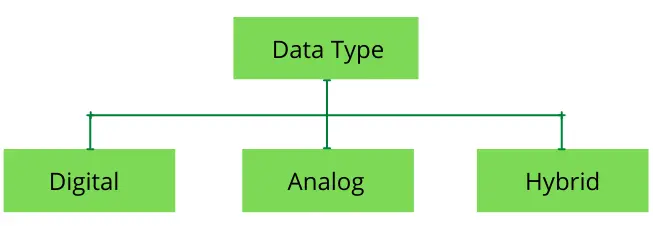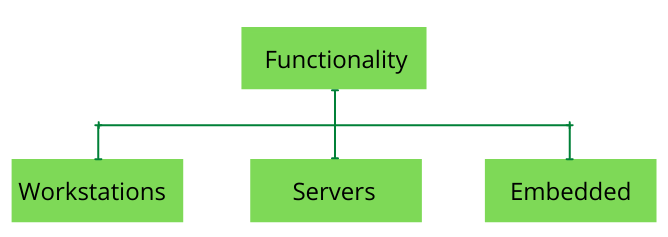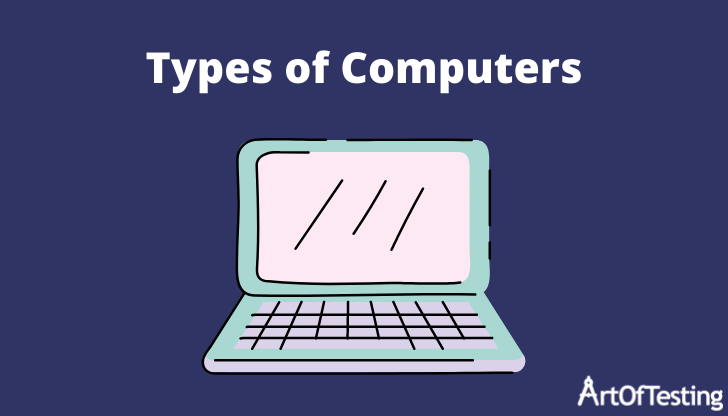Computers are a big part of our everyday lives, helping us with everything from simple tasks to complex work in various industries. It’s important to know about the different types of computers because each type is built to handle specific jobs.
For example, personal computers help individuals with work and entertainment, while supercomputers are used for things like weather forecasting and scientific research. By understanding the different types, we can see how computers are designed to meet the unique needs of people and businesses around the world.
There are hundreds of different tasks that require the need for computers. But, a single type of computer performing each of these tasks is not an easy option. This is why with the advancement in technology, we have come up with different types of computers. Each serves a different purpose.
In this article, let us look at the computer classifications which are classified based on the-
- Data type handling
- Purpose they serve
- Functionality
Content
Types of Computers Based on Data Handling Capabilities
Based on the data type handling, computers can be categorized as Digital, Analog, and Hybrid.

Digital
Personal computers are an example of a digital computer. These computers accept input in the form of 0s and 1s. The computer processes binary input and provides the output. These computers perform all the logical & arithmetical operations. Any input given in any language is first converted into binary language and then the computer processes the information. Examples – laptops, PCs, mobile phones, desktops, etc.
Analog
These computers process analog data. Analog data keeps varying. Hence, it does not have any discrete value. They read the continuous change in the input, process it, and then provide the output. Analog computers perform with equal diligence and accuracy. They are, however, slower than digital computers. They are also slightly less precise.
Analog computers are used for a Speedometer, thermometer, frequency, and signal of voltage, measuring the resistance of a capacitor.
Hybrid
Hybrid computers are a mix of both analog and digital computers. These computers perform a high level of calculations. Hybrid computers are quick and efficient. They take input in analog form, convert it into digital form, and then process it to produce an output. Scientists are also using hybrid computers for complex calculations. For example, in hospitals to measure the heartbeat of the patients, and at research institutes to measure earthquakes and other natural disasters.
Types of Computers Based on Size
Based on the purpose of a computer, we can classify the types of computing devices as micro, mainframe, super, and mini computers.

Microcomputer
Microcomputers are nothing but personal computers. These are single-chip systems. These are useful for personal use and can perform all the basic functions of the computer. Microcomputers require very little space and are comparatively inexpensive. Such computers have the most minimalistic requirement in terms of I/O devices. And have all the circuitry mounted on a single PCB. For example tablets, I pads, smartwatches, laptops, desktops
Minicomputer
Minicomputers bridge the gap between microcomputers and mainframes, supporting simultaneous access for approximately 5 to 300 users. Those who want to operate the system at the same time. You can see such computers at the billing counters of malls or large institutions.
Mainframe
Mainframe computers are useful when a large number of people are involved. Like in the health care or retail sector who want to access data simultaneously. These computers process large amounts of data.
In addition, mainframe computers have evolved a lot over the years in terms of speed, size, and efficiency. These computers are just below the supercomputers. And sometimes are even more useful than a supercomputer. Examples – IBM z Series, System z9, etc.
Supercomputers
The biggest and fastest computers are supercomputers. Such computers can process trillions of functions within a few seconds. We generally use MIPS ( Million Instructions Per Second) to measure their performance. These computers are specifically designed for scientific applications such as –
- Encryption decryption of passwords
- Weather forecasting
- Testing of nuclear weapons
- Scientific research of Earth and other planetary systems, etc.
Examples – PARAM supercomputer series, Gravity Pipe for astrophysics, Deep Crack for deciphering codes, etc.
Types of Computers Based on the Functionality

Workstations
Workstation computers are for single usage and professional purposes. These are like our basic laptops and desktops, but with added superior features. For example, a double-processor motherboard, an added graphics card, ECC RAM, etc. The workstations are more powerful as compared to generic PCs. These can handle heavy-duty functions. Like animation, CAD, audio & video editing, professional gaming, etc.
Examples: Apple PowerBook G4, SPARC CPU, MIPS CPU, etc.
Servers
These are hardware components or software programs that are built to assist other computers, termed as clients. Together, this architecture is called the client-server model. The client sends a request to the server, and the server responds in return with a result or a solution. This proves that these server computers are more powerful than standard computers. The main purpose of these computers is to share data and resources with other computers.
Different types of servers are useful for different needs and applications. For example, a cloud server, an application server, a database server, a file server, etc. Each of these servers has a different purpose for different client needs.
Embedded
These computers are mainly microcontroller-based systems. Used for processing specific tasks. Embedded computers have a combination of software and hardware components. But, are usually a part of a larger system. Each of its components is designed from scratch to serve a specific purpose or complete a specific task. Another characteristic that distinguishes them from a standard PC is that all of their components are integrated into a single PCB or motherboard. They are most helpful for industrial use. This is because of their ruggedness.
Examples: GPS systems, centralized heating systems, fitness trackers, digital watches, electronic calculators, etc.
Information appliances
Mostly portable devices designed for specific functions come under this category. They can perform very restricted tasks for which they are built, like text editors, music players, photography, videography, etc. The most common example is mobile phones. Many wearable devices are also available on the market.
This completes our article on the different types of computers. To sum up, it can be said that there is something for everyone.
More Computer Types
1. Quantum Computers
Quantum computers are a new and advanced type of computer that uses the principles of quantum physics to process information. Unlike regular computers, which use bits (0s and 1s), quantum computers use qubits, which can be both 0 and 1 at the same time. This makes them incredibly powerful for solving complex problems, such as encryption, drug discovery, and large-scale data analysis. Though still in development, quantum computers have the potential to revolutionize many industries by performing tasks much faster than traditional computers ever could.
2. Gaming Computer
Gaming computers are specially designed machines that provide the power and performance needed for an immersive gaming experience. They typically feature high-performance processors and graphics cards, allowing them to run demanding games smoothly with high-quality graphics. Gaming computers often come with ample RAM and fast storage options to reduce loading times and enhance overall performance.
In addition to hardware, gaming computers are usually equipped with customizable lighting and cooling systems to keep temperatures down during intense gaming sessions. Many gamers also prioritize aesthetics, choosing cases and components that reflect their personal style. Overall, gaming computers are built to deliver speed, visual quality, and responsiveness, making them essential for serious gamers.
Future trends in computing
The future of computing is poised for exciting advancements that will reshape how we interact with technology.
Artificial Intelligence (AI) is at the forefront of this transformation, with improvements in machine learning, natural language processing, and automation. As AI systems become more sophisticated, they will enhance decision-making, streamline processes, and offer personalized experiences in various sectors, from healthcare to finance.
Cloud computing continues to evolve, providing flexible and scalable resources for businesses and individuals. The rise of multi-cloud strategies will allow organizations to optimize their operations by using multiple cloud services, ensuring greater reliability and performance. Innovations in cloud security will also address growing concerns about data privacy and protection.
Edge computing is gaining traction as it brings processing power closer to where data is generated. This reduces latency and bandwidth usage, making it ideal for applications like Internet of Things (IoT) devices, autonomous vehicles, and real-time analytics. By processing data locally, edge computing enhances efficiency and responsiveness in an increasingly connected world.
Together, these trends highlight a future where computing becomes more intelligent, accessible, and integrated into our daily lives, driving innovation and improving overall quality of life.
Conclusion
From the pocket-sized power of smartphones to the immense processing muscle of supercomputers, the world of computers offers a dizzying array of choices. Understanding the different categories of computers, whether categorized by size, purpose, or processing power, equips you to select the perfect tool for the task. As technology continues to evolve, the lines between these categories may blur, but one thing remains constant: computers are fundamental tools that empower us to work, learn, and connect in ever-more innovative ways.
FAQs
How do tablets differ from laptops?
- Tablets are touch-centric devices, lighter and more mobile than laptops, but typically offer less processing power.
What are the main features of an ultrabook?
Ultrabooks are thin, lightweight laptops prioritizing portability and battery life, often with high-quality displays.
What are mainframe computers used for?
Mainframe computers are large, powerful machines used for critical business tasks requiring high volume data processing and transaction handling (e.g., banking, finance).
Are gaming computers different from regular desktops?
Gaming computers prioritize powerful graphics cards and processors for smooth performance in demanding games, often with enhanced cooling systems.
Which type of computer is best for personal use?
The best type of computer for personal use is typically a laptop or a desktop PC, depending on your needs. Laptops offer portability, making them ideal for users who need to work or browse on the go. Desktops, on the other hand, often provide more power, better performance, and larger screens at a lower cost, making them suitable for home use where mobility is not a priority. Ultimately, the choice depends on how you plan to use the computer, whether for casual browsing, gaming, content creation, or other specific tasks.

I really like this, it’s really helpful
Thank you. So much needed information especially for students
It was helpful and explanatory
It was helpful and explanatory and complete.
Thanks for the best notes a computer
Welcome :-)
Thanks 👍
I learn that computer is the eletronical device that transforms data in to information